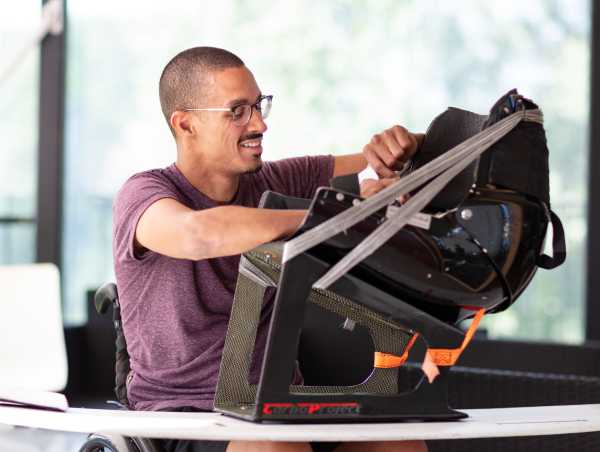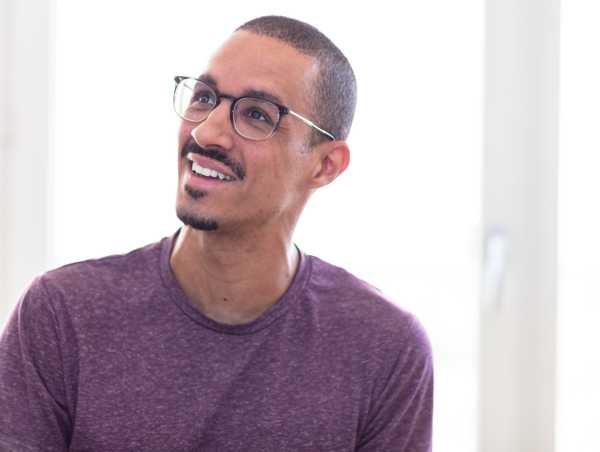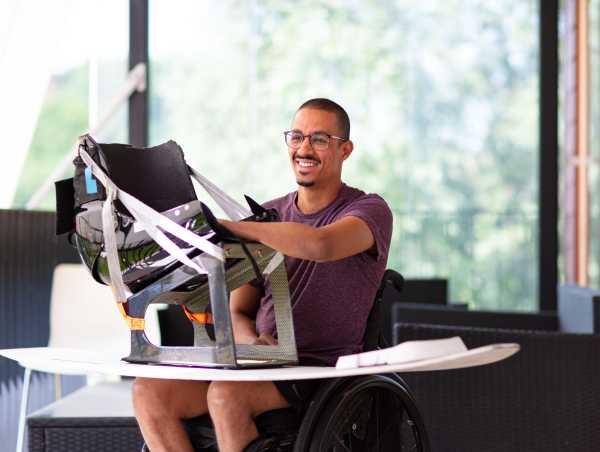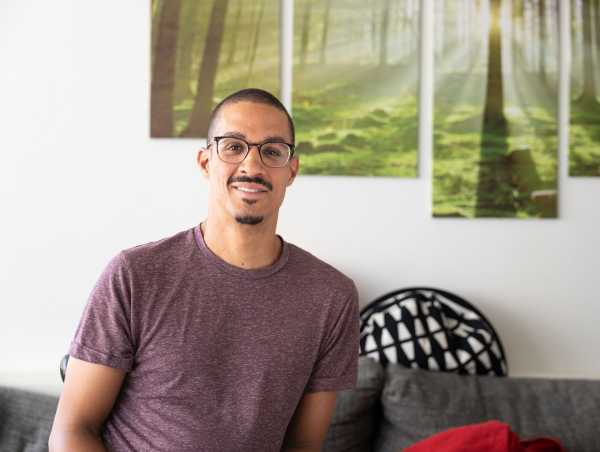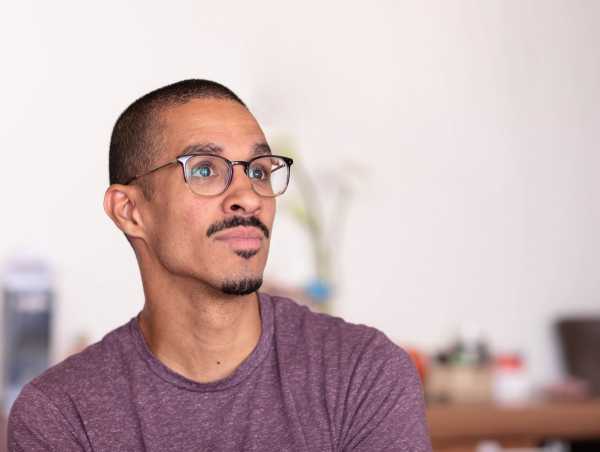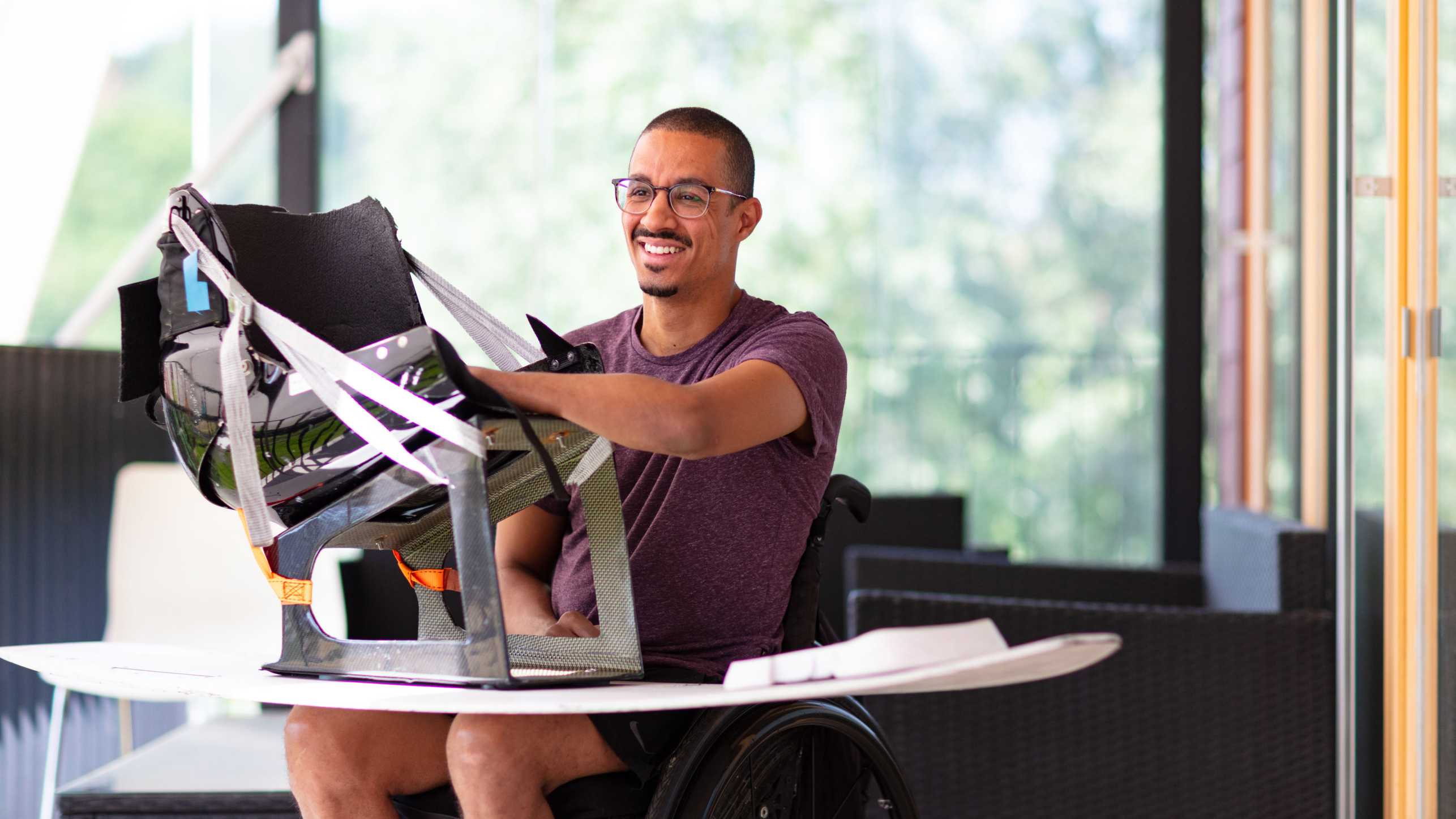David Mzee - swiss national wheelchair rugby player
RESC: David, how do you usually introduce yourself when you meet someone new?
David Mzee (DM): Hi, my name is David.
RESC: What is your “superpower”?
DM: I speak many different languages: irony, English, German, a little bit of sarcasm and many Swiss German dialects. Moreover, I’ve been described as multiplex. I’m in the starting line-up for the Swiss national wheelchair rugby team. This year we qualified for the first time in 16 years for the world championship. I’m also one of the first people to take steps after a spinal cord injury, thanks to an electrode that was implanted onto my spinal cord. I’ve studied human movement sciences and sports at ETH Zurich and finished my Master’s summa cum laude in 2016. I’m the only physical education teacher in Switzerland who is dependent on a wheelchair. A few years ago, I developed a unique way of wakeboarding for people with quadriplegia who don’t have enough function in their hands to hold on to the handle by themselves. While doing this, I also learned how to kitesurf and made it on to Switzerland’s Naish team. Currently I’m one of the only people with quadriplegia in the world who does this sport. Moreover, I’m an inspirational speaker and have had the privilege to give talks in many different countries.
RESC: What are people without physical limitations most amazed by when they meet you?
DM: There isn’t anyone without physical limitations. Even Superman is limited by Kryptonite. But what many people are amazed by when they meet me is how warmly I greet them. What they usually don’t know is that I’m terrible at remembering faces, so if I meet somebody new, I’m sometimes not sure if we have met before. So to make sure I’m not being rude, I greet them as if we’ve met before even though we might not have.
RESC: In which situations do you feel “dis-abled”?
DM: I’m very restricted when it comes to flying. So far g=9.81 m/s2 (gravity) always prevailed; I never made it to more than a bit over a second. Furthermore, I am amazed when people remember several names after just hearing them once. That is a superpower I’m still working on.
RESC: What is your greatest wish for the future?
DM: In politics I hope that we won’t forget that the left is right and also the right is right. Either way we can go too far and it’s about balancing and negotiating the two forces. It’s even the same with inclusion. We need it as much as we need exclusion. I think that I, as a wheelchair user, should be excluded from getting a job as a lifeguard on the beach. Although I can swim, I cannot get through the sand with my wheelchair, nor can I use my legs to swim back to shore while holding a rescued person. It is probably also good to exclude blind people from being bus drivers and someone who speaks neither English nor German should not be allowed to work in court as an interpreter from English to German.
What I am trying to say is that excluding people based on a competence-based skills catalogue is a good thing. I think most people would agree that it is not okay to exclude people based on the colour of their skin, their sex, religion or race. By the same token, it is also not okay to give preference to people based on the colour of their skin, their sex, religion or race. I was invited on stage at a beautiful event a few months ago. The lady who booked me said that it would be wonderful to have me, not least so it wasn’t just old white men on stage. I didn’t pay too much attention to the statement, but if someone told me the same today, I would refuse to be part of the event. If the old white men were more competent than I am then they should ask them on stage. If not, they should consider inviting me, regardless of me being younger, having darker skin or being in a wheelchair.
Instead of spending too much energy on frantically including everybody in everything, I advocate for spending a lot of energy in keeping the competence-based skills catalogue updated. Can a guy in a wheelchair be a physical education teacher at a vocational school? The schools I work for concluded that, in my case, it is possible. But can someone with quadriplegia work as a firefighter? Even with the technical possibilities we currently have, I dare to say no. But if one day for whatever reason it might be possible, then it is important to get the catalogue right – by carefully balancing and negotiating the forces.
Bio
David Mzee, born in 1988 to a Kenian father and a Swiss mother, has loved sports since his childhood. He studied Human Movement Sciences and Sport at ETH Zurich. In 2010, he sustained a spinal cord injury while training on the trampoline. Thanks to an electrode implanted in his spinal cord, he is one of few quadriplegics who are able to walk a few steps. David received an Excellence Scholarship for his Master's degree, graduated summa cum laude in 2016 and obtained a teacher diploma in 2018. He is the winner of the Willi Studer Prize for best student in Human Movement Sciences 2016 at ETH. Today, David works as a sports teacher in Wetzikon, Zurich and consults various companies with his expertise in human movement. The father of a daughter plays on the Swiss national wheelchair rugby team.
external page Dave Mzee's Website
external page Swiss national wheelchair rugby team
external page Willi Studer Prize 2016 - Best Student in Human Movement Sciences ETH Zurich
external page ETH Foundation Excellence Scholarship
Miriam Daepp of the Competence Centre for Rehabilitation Engineering and Science (RESC) spoke with David Mzee in July 2022.
Image Gallery
